Ray Sweatman
Novelist, Poet, Satirist
Books
Fiction
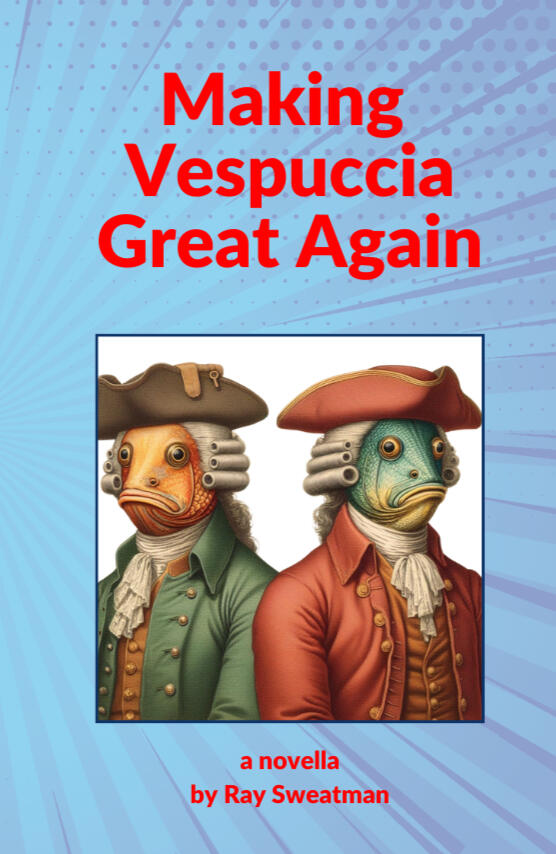
Available now at Amazon On Kindle here. Editorial review from Literary Titan here.
Armed with knife-throwing Supreme Court immunity and a flying trapeze of congressional majority, President McDonald’s Reality TV Circus is back in town. And this time his plans to make the United States of Vespuccia great again are more ambitious than ever. He is opposed by Blue state leaders, citizens, a dissident group known as The Pronouns and two mysterious figures from another world. Will they be able to stop him in time? Or will Vespuccia indeed succumb to greatness created in his image?Uproariously funny and scathingly perceptive by turn, this satirical comedy asks the very serious question: what next?
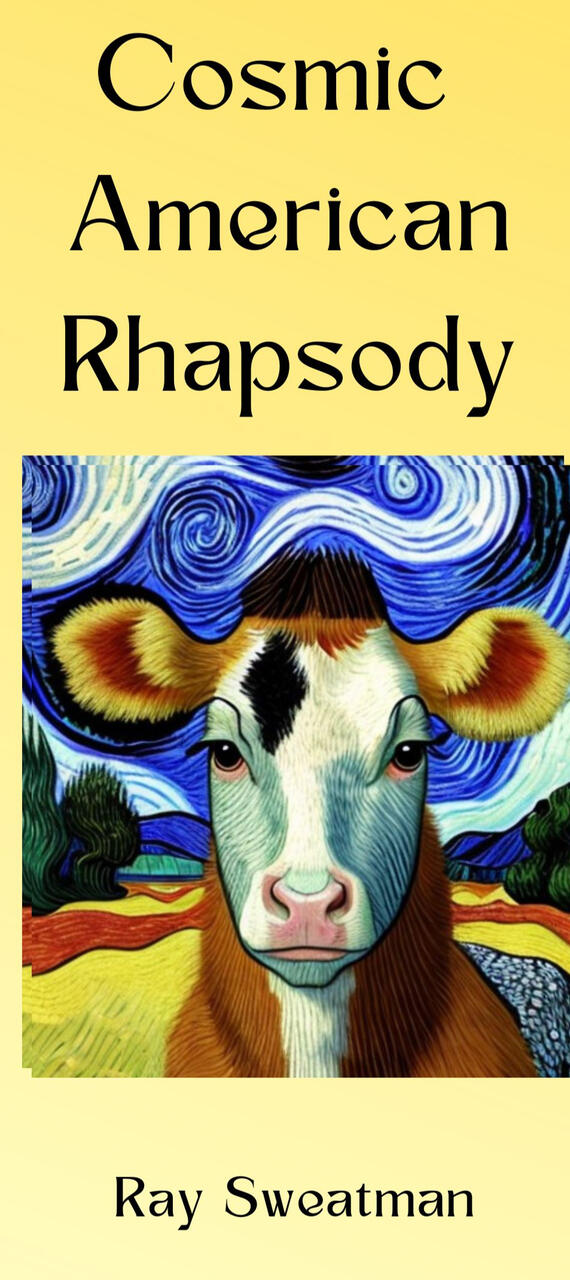
Get ready for a wild ride as country-rock pioneer, Gram Parsons, struggles to survive, both physically and spiritually at the Lost Highway Motel.As his life flashes before him, several colorful characters try to help him find the meaning of life, including the ghosts of his parents, a strange policeman, a couple of transcendentalists, and the animated animals from “Hee Haw.”With rich allusions to both popular and classical culture, this music biographical fiction is at turns hilarious, poetic, tragic, and thought-provoking.Available on Amazon and Kindle now. For a limited time only, Kindle ebook is free and paperback at publishing cost only.Cool review from Jeyranm:
"5.0 out of 5 stars an eccentric and imaginative tribute to the life and legacy of Gram Parsons
Reviewed in the United States on
Cosmic American Rhapsody by Ray Sweatman is an eccentric and imaginative tribute to the life and legacy of Gram Parsons, the country-rock icon whose pioneering influence still resonates. Set in the Joshua Desert, the novel follows Gram as he hovers between life and death after an overdose, shifting in and out of reality to relive formative moments. Guided by a guardian cow who reveals herself as the transcendentalist Margaret Fuller, Gram’s journey is punctuated by bizarre and surreal encounters with figures like Henry David Thoreau, Vincent Van Gogh, and even Elvis Presley. Sweatman’s portrayal of Gram is equal parts tragic and absurdly comical, capturing the highs and lows of his life. Gram’s trial by a bear-judge, a perilous run-in with the cast of Hee Haw, and a menacing alligator are only a few of the novel’s more surreal scenes, blending cosmic symbolism with sharp satire. Encounters with loved ones, both real and imagined, prompt Gram to reflect on his choices, losses, and the turmoil that defined his life and ultimately led to his untimely demise.Sweatman’s narrative doesn’t shy away from the sorrow and chaos of Gram’s last days, yet his tone never loses a sense of reverence for Gram’s contributions to music. The novel delves into the transformative power of genre-blending, celebrating Gram’s refusal to fit into a single musical mold. This tribute is made even richer with an extensive playlist on Spotify, providing a musical backdrop that deepens the experience.Cosmic American Rhapsody is a surreal exploration of legacy, regret, and artistic transcendence that asks readers to grapple with the fleeting nature of fame and the timelessness of art. For those interested in genre-defying narratives and musical history, this novel offers a wild, thought-provoking journey."
Poetry Books
Posin' in the Nude in the Woods for Dali
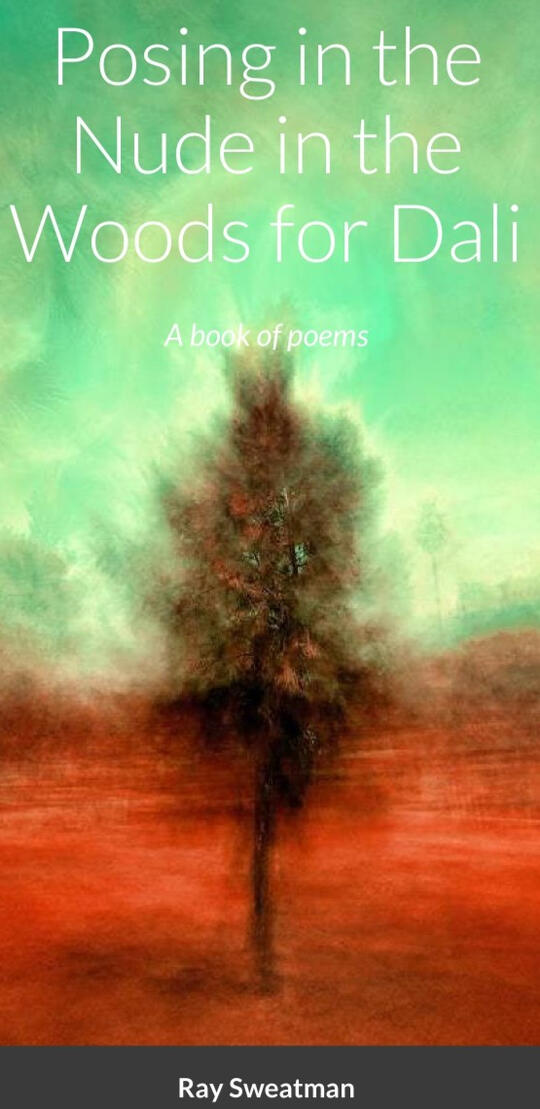
The joy and pain of love and life captured in short bursts, by turns funny, poignant, musical, surreal, magical and full of longing and imagination.Order here.
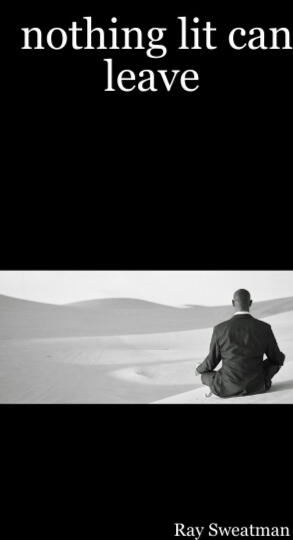
From the anthemic What Poetry Means to Me to the reflective title poem, these pieces roar and float and come to life. With their keen sense of rhythm and unique imagery, they are concerned as much with sound as they are with language. Entertaining and poignant, their overall theme is trying to transcend the plight of the transitory.Order here.Satirical Fiction
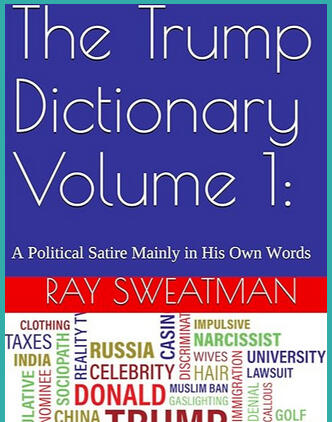
Written in the style of Ambrose Bierce's 'The Devil's Dictionary', it is a political satire mainly in Donald Trump's own word. Volume One covers his bid for presidency and through early 2017.Order from Amazon here.
Newsletter, Events,
and Sample Poems
Ray's Newsletter
Join my newsletter for free here Just hit "no pledge" when it asks.EventsWABE FM 90.1 City Lights, Speaking of Poetry radio spot here.Praise and Poems"This month's winners, oddly enough, all have something to do with sound and song and the process of seeing. The subjects travel synaesthetically. The first place winner, "Mondegreen" is a raucous wonderful rant that reads a little like a Philip Levine poem with a Barbara Hamby and Andre Breton flourish: it is a seeming narrative which picks up momentum and makes sudden surrealist lyrical turns as it moves forward "like all things that won't be held captive." It's a wild, dark-humor ride in a rowboat on the ocean with no oars!" --Elena Karina ByrneRead Mondegreen from Posin' in the Nude in the Woods for Dali
here.
IBPC Poetry Awards
October 2005
Judge Frank WilsonFirst Place
little love tattoos
by Ray Sweatman from Nothing Lit Can Leave
Salty Dreams Poetry Boardwhen we dreamed the same dream at the exact same time
the face of Big Ben cracked and smiled stuffed cuckoos
came unstuck exploded & flew the plank all over Harold Lloyd's latest prank,
broken only by the fall of all the walls from China to Jerusalem, feathers everywhere, made real
by our authentic preconscious sounds as real as red apples coming down,
made to flee because of their redness, dropping from the perfect sky where you & I
nibble at the common dream of skin shared, peeling away the illusions
that we are somehow separate, building little love tattoos to mark the light
and air and all things above the laws of gravity, (for when the world returns
& oh how it always does, heavy & absurd but never quite absurd enough
to remind us that we are) yours a dancing marionette, mine a string of violet,
yours a Popeyed sailor man, mine a church key of oceanic proportions, opening
waves & waves gathering 'round the mouth, spitting out the seeds don't doubt
but the dream it is as fluid as the bed wherein we lie as changeling as
the changeling sky growing growing grow! spinning whoa whoa whoa
I thought I heard Tom Jones what's new pussycat whoa whoa whoa
and you say Land Ho!heal me cure me heal me of this feverish love spinning up and off the curb
and I say as head turns and flies your now crotchless panties in my eyes:
but darling...we've both had the cure and it's marriage.Oh love, can't we be content with this transitory madness come here & stand
on these pheromoneal airs with the wind & clouds & all these angel feathers
swirling 'round: let Harold hang from the weight of ceremonial responsibility
let the staircase burn don't try to save me take what's left of this skyscraper
let the stars prance & melt in your microwave as a bum to a harlot turns
your cheeks the sweetest scarlet I love it when you wear my curtains!kiss me, bite me, make your silly marks, make that chimney sweep
work in the morning.
Text
Would love to hear from you.
To contact, fill out form below.
If you'd like to join us on beatsense, click on the music button and we'll see you on Backstreet Jellyroll.
Click on the Substack button to join Ray's Newsletter for free.
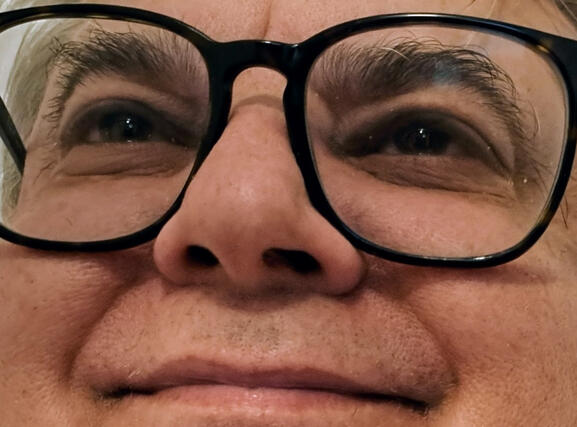
Ray Sweatman is a poet, satirist and novelist from Atlanta, Georgia. He has an MFA from Columbia University and has published two novellas, including Making Vespuccia Great Again and Cosmic American Rhapsody, two books of poetry, and one other satirical work, The Trump Dictionary. More information can be found at https://raysweatman.carrd.co